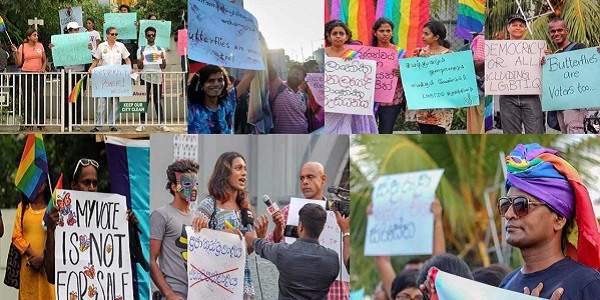The Supreme Court today commenced a hearing into the Special Determination petition filed challenging the constitutionality of the private member’s bill submitted to parliament seeking to amend Sri Lanka’s penal code with the aim of protecting the country’s LGBTQI community.
The Supreme Court’s three-judge bench, comprising Chief Justice Jayantha Jayasuriya, Justice Vijith Malalgoda, and Justice Arjuna Obeysekera, took up for special determination, in terms of the Supreme Court’s special jurisdiction, the validity of the “Penal Code (Amendment) Bill,” which is a private member’s bill moved by Member of Parliament Premanath C. Dolawatta.
Attorney-at-Law Dharshana Weraduwage, appearing for the petitioners, informed them that Section 365 of the Penal Code (as amended) was proposed to be amended by Clause 2(i) of the bill. He alleged that the said clause seriously removed the safeguards placed by the legislature in Section 17 of Amending Act No. 22 of 1995 to protect children below the age of 16 from, among other things, sexual exploitation. Accordingly, he argued that said Clause seriously violates several articles, including Articles 01, 03, 04(d), 12(1), and 14(1)(f) of the Constitution, and would therefore duly require the approval of the people at a referendum by virtue of the provisions of Article 83 of the Constitution.
President’s Counsel Sanjeeva Jayawardena, appearing for the Member of Parliament Dolawatta, submitted that sections 365 and 365A represented grossly antiquated and anachronistic legislation that was violative of the rights of gay people, although such persons too are entitled to equality and equal protection of the law under article 12(1) and freedom from discrimination on the basis of their sex, gender, or sexual orientation. He outlined how a very progressive judgment of five judges of the Supreme Court of India had held that gay people are entitled to the same rights and protections as heterosexual people under the corresponding provisions on equality under the Indian constitution, and they cannot be vilified on the basis of their sexual orientation. He also said although the penal provisions in Sri Lanka criminalized such activity, it was a colonial hangover from the time of the British in 1833, but nevertheless, even England had thereafter espoused new thinking and had decriminalized such activities by the year 2004.
Jayawardena further stated that in addition to the second respondent, the proponent of the bill, he was also appearing in a completely different and unrelated capacity for several prominent intervenient petitioners in this case, who included women and media collectives, Prof. Savithri Goonesekere, Dr Radhika Coomaraswamy, and Ramani Muttetuwegama, etc.





